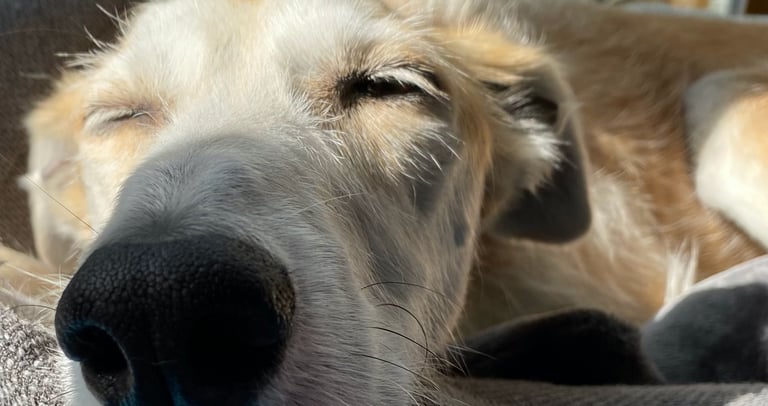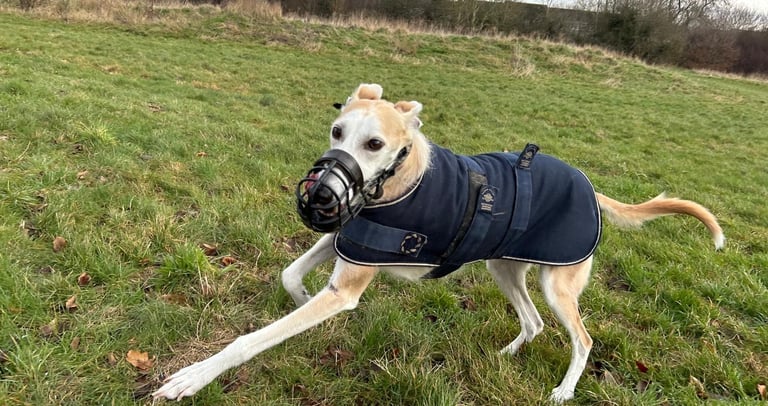
Beyond the Muzzle: Why We Shouldn’t Judge by Appearances
A gratuitous opportunity for me to combine two of my favourite things: Finn the lurcher and non-verbal communication.
Helen Crossley
1/20/20254 min read


Beyond the Muzzle: Why We Shouldn’t Judge by Appearances
A gratuitous opportunity for me to combine two of my favourite things: Finn the lurcher and non-verbal communication.
Finn the Lovely Lurcher
As some of you know, Finn is our lovely, daft dog.
He’s a bit of a local celebrity, well-known to the neighbours for his antics. Most days, you’ll find him sitting pride of place in our front window, keeping a watchful eye on the local cats, urban foxes, and his feisty Border terrier mates next door but one.
Finn is no stranger to mischief. Last month, during his morning walk in the park, he decided he’d had enough.
It was raining, after all, so he turned tail and went home on his own.
My husband spent over an hour searching for him, only to find Finn waiting on the doorstep looking rather pleased with himself. We were incredibly lucky, he’d crossed a busy road to get home safely, and our fab neighbours looked after him until my husband arrived.
Unfortunately, Finn’s had a bit of a tough time recently. Last year, after weeks of tests and endless worry, the vet ruled out anything life-threatening and diagnosed him with severe food allergies. These allergies mean Finn is now on a strict diet. No treats, ever. (Yes, Finn, that includes cheese!)
To keep him safe, we’ve had to make some adjustments. When he’s off-lead and playing with his doggy pals, Finn wears a muzzle. Without it, he’s a scavenger extraordinaire, sniffing out the tastiest “snacks” in the woods, which could make him very sick.
The Snap Judgements We Make
When Finn wears his muzzle, I often find myself explaining it to strangers: “He’s really friendly; he just has to wear the muzzle because of food allergies.”
It’s become second nature to offer this explanation because I can’t help noticing how some people react.
The subtle shift in body language, the hesitation to continue walking in the same direction, or even the decision to avoid us altogether. It makes me sad because Finn is the friendliest, happiest boy who loves meeting people and other dogs.
Happily, after my explanation, most people are very lovely and accepting and I understand why they are initially cautious.
These little ‘muzzle moments’ remind me of how often we judge by appearances, making snap decisions about people or situations based on very little information. We all do it—no judgements here. Finn’s muzzle might look intimidating to someone who doesn’t know him, but it hides a reality they can’t see: a sweet, goofy dog with an unfortunate allergy.
Heuristics or Mental Shortcuts
Heuristics are mental shortcuts that help us solve problems and make decisions quickly. They’re an effective bit of internal brain tech, allowing us to navigate the world efficiently.
However, these shortcuts can be influenced by various factors:
1.Availability of information: For example, other dog walkers lack information about Finn’s allergy and why he wears the muzzle.
2.Familiarity with the situation: Some people may have had a bad experience with muzzled dogs.
3.Past experiences of fear or anxiety: Someone who’s had a bad encounter in the past might already feel wary.
4.A novel situation: For some, Finn might be the first muzzled dog they’ve encountered, so they’re unsure how to react.
5.Underlying mood: General anxiety or stress may amplify someone’s reaction in the moment.
These shortcuts aren’t inherently bad, but they can lead to assumptions that don’t reflect reality.
When Assumptions Hurt
It’s not just about dogs, though. How often do we make snap judgements about the people we meet?
· That confident colleague who seems to have it all together might be struggling with depression.
· The quiet person at a party might be shy, not rude.
· A manager implementing an unpopular decision might be following difficult instructions they fundamentally don’t support.
These assumptions shape how we treat others, which in turn affects how they feel about themselves.
Imagine you’ve decided someone is rude because they’re quiet, seem reluctant to engage, and rarely initiate conversation. In response, you might give them a wide berth, assuming nothing good will come from interaction, sounds exhausting... right?.
But what if you overrode that judgement? A smile or a simple conversation might reveal a different reality.
Choosing Curiosity Over Judgement
Walking Finn reminds me to pause and consider what’s behind the surface.
What’s the story behind what we see? Often, we just don’t know.
In Finn’s case, the muzzle tells a story of care and protection, not aggression.
Every time I catch myself making a snap judgement (and I often don't even notice!!! ... those pesky heuristics are clever!), I try to stay curious, not critical.
What if we approached people with curiosity and compassion instead of judgement?
A Final Reflection
When I walk with Finn and his muzzle, I remind myself how little we really know about someone’s story from the outside. Whether it’s a dog or a person, appearances can be deceiving.
So next time you notice yourself making a quick assumption, pause.
Choose curiosity over judgement.
You never know, you might discover something beautiful behind the surface, just like lovely, daft Finn.






